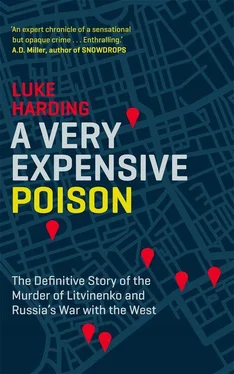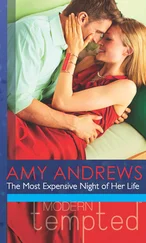The cook plot had clearly fallen through. Another approach was required.
At 11.41 a.m. – eight minutes after the unsuccessful conversation with C2 – Lugovoi called Litvinenko up on his mobile. He suggested a meeting. Why didn’t Litvinenko join him later that day at the Millennium Hotel? Litvinenko said yes; the plot was back on.
Scotland Yard would later precisely fix Litvinenko’s movements on the afternoon of 1 November: a bus from his home in Muswell Hill, the tube to Oxford Circus, a 3 p.m. lunch with his Italian associate Mario Scaramella in the Itsu sushi restaurant in Piccadilly. In between he fielded several calls from Lugovoi, who was becoming increasingly importunate. Lugovoi called Litvinenko again at 3.40 p.m. He told Litvinenko to ‘hurry up’. He had, he said, to leave imminently to watch the football.
Lugovoi would tell British detectives that he arrived at the Millennium Hotel at 4 p.m. The CCTV shows that he was lying: half an hour earlier, at 3.32 p.m., Lugovoi appears at the front desk and asks for directions to the gents’. Another camera, camera 4, records him walking up the stairs from the foyer. The image is striking. Lugovoi seems preoccupied. He’s unusually pale, grim, grey-visaged. His left hand is concealed in a jacket pocket. Two minutes later he emerges. The camera offers an unflattering close-up of his retreating bald spot.
And then at 3.45 p.m. Kovtun repeats the same procedure, asking for directions, vanishing into the gents’ toilets, reappearing three minutes later. He’s a slight figure. What were the pair doing there? Washing their hands having set the polonium trap? Or preparing the crime, a heinous one, in the sanctuary of one of the cubicles?
Radiation tests were to show massive alpha radiation contamination in the second cubicle on the left – 2,600 counts per second on the door, 200 on the flush handle. Further sources of polonium were found on and below the gents’ hand-dryer, at over 5,000 counts per second. There was full-scale deflection in two sinks.
The multiplex system records someone else arriving at 15.59 and 41 seconds – a fit-looking individual, wearing a blue denim jacket with a fawn collar. He’s on his cellphone. This is Litvinenko at the blurred edge of the picture; he calls Lugovoi from the hotel lobby to tell him he’s arrived. The CCTV tells us little beyond this. Apart from one important detail. Litvinenko never visits the hotel bathroom. He’s not the source of the polonium: it’s his Russian companions-turned-executioners who bring it with them to London, in this, their second poisoning attempt.
* * *
Earlier that week I had flown to Moscow with my wife Phoebe. I was there on a recce – my newspaper, the Guardian , was posting me to Russia as its new Moscow bureau chief. It was a moment of excitement and trepidation. There were logistical issues. Where would our children – Tilly, eight, and Ruskin, six, go to school? And how in this churning metropolis of 12 million people – amid traffic, Soviet tower blocks and eight-lane boulevards – might we find a space to call home?
We flew to Moscow with British Airways, flight 875. Our borrowed flat overlooked Novy Arbat in central Moscow. There were meetings with property agents and tours round a succession of rather dismal, low-ceilinged flats. Visits, too, to the British and American schools. On the second day it snowed: heavy flakes tumbling from a grey sky onto a shuffling procession of vehicles.
My previous postings had been in Delhi and Berlin. We considered ourselves adaptable, good at languages, cosmopolitan. But Moscow looked like a challenge. Our move was scheduled for January and the depths of a Russian winter.
On 30 October we flew back to the UK, on BA 875. The plane was full. Most passengers were Russian football fans on their way to London for the CSKA match. They were a drunken bunch. A few had been swigging from bottles of duty-free. They refused to sit down. Someone smoked in the loo. And then a sozzled Russian travelling with his teenage children punched a steward in the face. The pilot was given priority landing. At Heathrow, armed police boarded the plane and dragged him away. They found a bottle of cognac – two-thirds empty – rolling under his seat. His daughter was crying.
It was a memorable flight, the atmosphere of revelry ending up sour. Memorable for several reasons, it turned out. Lugovoi had flown on the same BA plane during his second October trip to London, days before. Though we didn’t know it, the plane was contaminated with polonium.
We had been sitting just a few rows away from Lugovoi’s radioactive seat, we later discovered. It was a prescient coincidence. The hidden events unfolding in Moscow and London would dominate my professional life in Russia and beyond, for the next four years, and cast a dark shadow over our family life, too.
Meanwhile, the large number of Russians visiting London for the football was the perfect cover for Lugovoi and Kovtun. Amid this influx, with thousands of Russian passport holders coming through Heathrow, who would spot a couple of assassins, carrying with them an invisible weapon?
* * *
While serving with the FSB in Russia, Litvinenko perfected his observation skills. It was part of his basic training. How to describe the bad guys: their height, build, hair colour and distinguishing features. What they were wearing. Any jewellery. How old. Smoker or non-smoker. And of course their conversation – from the major stuff such as admissions of guilt down to trivial details. For example, who offered whom a cup of tea?
When detectives later interviewed Litvinenko he gave them a full and – in the circumstances – remarkable account of his meeting with Lugovoi and Kovtun in the Pine Bar. He made one small error: he said the teapot on their table was silver. In fact it was white and ceramic. Litvinenko confused it with the silver teapots in the Park Lane Sheraton Hotel, where he’d met Lugovoi the previous week, the rather crumbling institution on Piccadilly with the China-themed Palm Court restaurant. He also forgot Kovtun’s first name; after all, he had only met him on one previous occasion.
Otherwise, his recall was perfect.
Litvinenko said that Andrei approached him in the foyer from the left side and said: ‘Let’s go, we are sitting there at the bar.’ He followed Lugovoi into the bar; Lugovoi had already ordered drinks. ‘He sat down in the corner and I sat. There were two tables pulled close together, sort of like a single one.’ Lugovoi sat with his back to the wall; Litvinenko was diagonally across from him on a chair. There were glasses sitting on the table but no bottles. And ‘mugs and a teapot’.
Litvinenko’s account of the conversation is that Lugovoi explained he could only stay for ten or fifteen minutes. ‘Straightaway a waiter came up to us,’ Litvinenko told Detective Inspector Brent Hyatt. It was a waiter with ‘grey hair’, wearing a white shirt and black bow tie. This was Norberto Andrade, the hotel’s veteran head barman.
As Lugovoi knew, Litvinenko didn’t drink alcohol. Moreover he was hard up and reluctant to spend any money of his own in a fancy establishment. Andrade approached Litvinenko from behind, and asked him: ‘Are you going to have anything?’ Lugovoi repeated the question and said: ‘Would you like anything?’ Litvinenko said he didn’t want anything.
And then: ‘He [Lugovoi] said, “OK, well we’re going to leave now anyway, so there is still some tea left here, if you want to you can have some.” And then the waiter went away, or I think Andrei asked for a clean cup and he brought it. He left and, when there was a cup, I poured some tea out of the teapot, although there was only a little left in the bottom and it made just half a cup. Maybe about 50 grams.
Читать дальше












